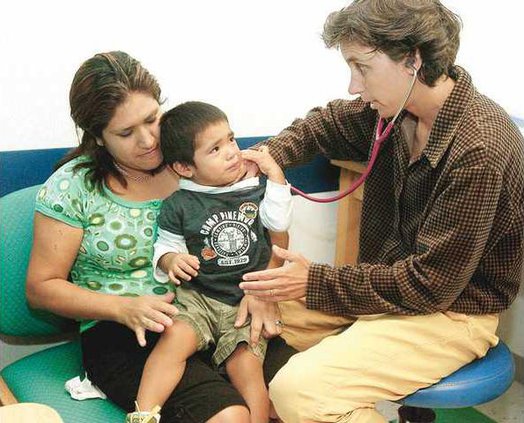Cough and cold season is fast approaching, but parents no longer have the arsenal of store-bought remedies they once used to treat their ailing kids.
In January, the federal Food and Drug Administration issued a statement advising that over-the-counter cold medicines should not be given to children under age 2.
Studies have shown that these products are not effective in treating cold symptoms in young children, but the medicines do carry significant risks, including accidental overdose.
The American Academy of Pediatrics has gone a step further, advocating a ban on these products for children under 6. The FDA isn’t yet ready to make that recommendation. But manufacturers of cold medicines have voluntarily been adding the phrase "do not use in children under 4" to their labels.
Most pediatricians have been telling parents that the products don’t really help and may actually cause harm.
"It’s never been proven that these medicines have any benefit," said Dr. Chandra Miller, a pediatrician at the Longstreet Clinic in Gainesville. "But they can have some serious side effects. They may increase your heart rate, make you very drowsy, or interfere with breathing."
About 7,000 children end up in hospital emergency rooms each year with bad reactions to cold medications.
In many cases, they ingested too much, either because of a parent’s error or because a toddler got a hold of the sweet-tasting medicine and thought it was juice or candy.
"The biggest thing is, some people don’t know the correct dosage and they end up overdosing (the child)," said Scott Barton, a pharmacist at Riverside Pharmacy in Gainesville.
Even when parents measure a product correctly, they may be giving the child more than one medicine, each of which contains the same ingredient.
Barton said parents are well-meaning and don’t realize that their child is getting a high cumulative dose of a drug.
"Sometimes they think if a little medicine is good, more is even better," he said. "I’m a parent, too. When your child is sick, you just want to do something to help."
But there are things you can do that don’t involve potent pharmaceuticals.
For babies, Chandler recommends saline drops and a syringe bulb to help remove nasal mucus. For older children, she advises parents to elevate the head of the bed, to promote mucus drainage.
"Make sure they’re drinking plenty of fluids — water, juice, Gatorade, even chicken noodle soup," she said.
To treat an annoying cough, a spoonful of honey can work wonders.
"If the child is over age 2, a little bit of honey will help more than cough medicine," said Chandler.
She cautions, however, that honey should never be given to babies. Honey sometimes contains botulism spores that are harmless to adults and older children, but can make babies ill because their digestive systems are immature.
For older kids, though, honey can act as a natural cough suppressant. "It’s like an old wives’ tale that’s been around for a long time, but it actually works," said Chandler.
The good news about colds is that symptoms generally improve within a week to 10 days, regardless of treatment. But with some kids, just letting them "tough it out" is a bad idea. When a child has a condition such as asthma, a simple viral infection can lead to life-threatening breathing problems.
Dr. Andy Nish, a Gainesville allergist, said if a child has asthma, parents should keep the condition under control with daily maintenance medication.
"That’s especially important at this time of the year," he said. "We can’t prevent the child from getting a cold, but we can prevent them from having an asthma attack."
For general cold symptoms, Nish said a nasal decongestant such as Afrin can be used, but only for a couple of days. Beyond that, it creates a "rebound" effect that makes congestion worse. Saline nasal spray, however, can be used with no limitations.
"A humidifier (in the bedroom) can help," he said. "But be careful if you have an allergy to mold (which can grow inside the machine). Also, just use water mist. Putting a product like Vicks VapoRub in it may trigger an asthma attack."
For chest congestion, Nish recommends guanifesin, the active ingredient in Mucinex. "It’s very safe, and it helps loosen up stuff," he said.
But even though guanifesin is labeled as a cough remedy, parents should not think that the product will get rid of their child’s cough. The medicine actually promotes the flow of mucus, which increases the amount of coughing.
The most vexing aspect of a cold is often a cough that just won’t quit, keeping both the child and everyone else in the household awake. Nish said there aren’t many medicines you can safely give for that.
"There’s really no good, effective cough suppressants until you get into narcotics such as codeine, which you really don’t want to give to a little kid," he said.
Nish added that an ordinary cold shouldn’t produce a severe cough.
"A significant, nonstop cough would make me wonder if there’s something else going on, such as asthma, pneumonia or croup," he said.
"Symptoms that last more than a week to 10 days, or get worse, could indicate a bacterial infection that needs antibiotics."
Sue Price, a Gainesville stay-at-home mom, said she used over-the-counter cold medicines with her two older children, who are now 6 and 10.
But with her 3-year-old son, who’s been diagnosed with a seizure disorder, she doesn’t want to expose him to any unnecessary drugs.
"I’m a little paranoid about things over the counter," she said. "I go through my pediatrician or talk to the triage nurse and ask for advice. They usually tell me to run a cool-mist vaporizer for chest congestion."
When she gave nonprescription medicines to her other children, did it help?
"I’m not sure if it really did," Price said. "It could be that they were getting better anyway, and (any improvement) was just coincidental."

